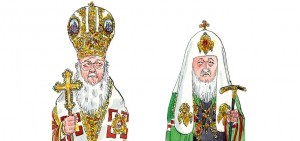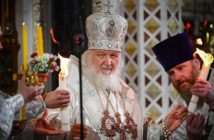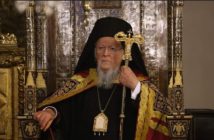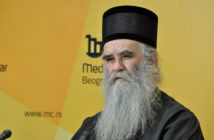 Source: The Economist
Source: The Economist
by Bruce Clark
Imagine over 300 mostly grey-bearded men of religion, bearing sonorous titles and varying degrees of real authority, gathering in an ancient building in Istanbul which long formed part of the Topkapi Palace, a residence of the Ottoman sultan-caliph. No, the participants in the most important gathering during the summer of 2016 won’t be sheikhs or muftis, although their chosen venue is now a landmark in a mainly Muslim city. These visitors will take their cue from earlier days in the city’s history and from the venue, the church of Hagia Eirene (which can be translated “holy peace”).
They will be Orthodox Christian bishops, with flocks anywhere from Siberia to the war-zones of the Levant. Their meeting, due to take place around the feast of Pentecost, which falls on June 19th, will try to ensure that eastern Christianity punches closer to its weight in world affairs. With Patriarch Bartholomew I of Constantinople presiding, the prelates can be expected to issue a joint declaration on global issues like poverty, the environment and embattled religious minorities. It is also hoped that they will shed some clarifying light on their relations with other Christian churches and—most contentiously—with one another.
Assuming it goes ahead (until the last moment it will be vulnerable both to inter-Orthodox squabbles and to tensions in the host country, Turkey), the meeting will dramatically draw attention to Orthodox Christianity’s half-hidden existence. Depending on how you count, the total number of its adherents is given as anywhere between 140m and 250m or 300m. (Most people in Russia, Ukraine and Belarus, whose combined population is about 200m, tell pollsters they are Orthodox, at least nominally; that helps account for the higher estimate.)
To outsiders, it seems that the church’s ability to speak out in the world is limited by its extreme decentralisation. There is nothing like the vertical Roman structure, which gives the pope a personal stature recognised even in secular circles. But, for the Orthodox, the lack of such a vertical structure is a point of principle.
As they read history, the east-west split in Christianity occurred in 1054 because the pope asserted an illegitimate top-down authority. Eastern bishops opposed Rome’s effort to impose a version of the Nicene Creed that in their view subtly downgraded the Holy Spirit. In Christian doctrine the Holy Spirit, the power of God to inspire and illuminate human beings, ranks with the Father and the Son as one of the three persons united in a single God. As the Orthodox see things, the papacy broke with pure Christian doctrine when it claimed that the pope was the unique “vicar of Christ” on Earth.
At a more practical level, each of the 14 churches that recognise one another as part of world Orthodoxy enjoys administrative independence. But those churches will become better co-ordinated if Patriarch Bartholomew fulfils his hopes for the Great and Holy Council of bishops, which many will see as the most important Orthodox gathering since 787. For him, it is a diplomatic triumph that the meeting has been scheduled at all, given the rumbling rivalry between his see and that of Moscow. The Patriarch of Constantinople is recognised as “first among equals” in the Orthodox world; Moscow often seems to claim a kind of de facto preponderance within Orthodoxy by weight of numbers and strategic heft.
Basic doctrine will not be opened up in 2016 (that was settled by the seven early councils, Orthodox say), but some important issues of religious practice will formally be on the table, such as rules for fasting, the church calendar and inter-religious marriage. Even in these areas, Slavic conservatism is expected to preclude any substantial change.
But the life of Orthodox communities from California to Hong Kong will be affected by the atmosphere established at the council, to which each of the 14 churches can send 24 bishops. That atmosphere may depend a lot on the chemistry between two personalities: the host and the Patriarch of Moscow.
Bartholomew I is a polyglot ethnic Greek (although ex officio, a Turkish citizen) who enjoys global esteem because of his environmental initiatives. He has warm relations with other Christian churches and Western political leaders. Patriarch Kirill, the head of the Russian church, has close ties with President Vladimir Putin, although their priorities may not be identical. In his comments on the Ukrainian conflict, Kirill has at times given heart to the Russian-nationalist cause and sometimes sounded more conciliatory, perhaps reflecting the fact that thousands of parishes under his ultimate authority lie in government-held parts of Ukraine.
Rivalry between Constantinople and Moscow can flummox Western religious leaders, including the pope, who want closer relations with both. Patriarchs Bartholomew and Kirill have known each other a long time, but they differ over church authority in the United States, western Europe and, above all, Ukraine.
For nationalist Russians, the fact that Kirill oversees much of Ukrainian Orthodoxy is a bond between the two Slavic nations. But many Ukrainians dream of a new national church under Bartholomew’s aegis. When Bartholomew visited Ukraine in 2008, he steered a careful line, acknowledging both Kirill’s position and the legitimacy of Ukraine’s religious aspirations.
For the council to succeed, such differences must be finessed. It is sure to be a moving experience for the bishops: chanting beloved hymns in celebration of Pentecost, the coming of the Holy Spirit, in the spot where the Spirit’s divinity was proclaimed 1,635 years earlier. A propitious moment, perhaps, for breakthroughs.
Originally published on November 2, 2015.



